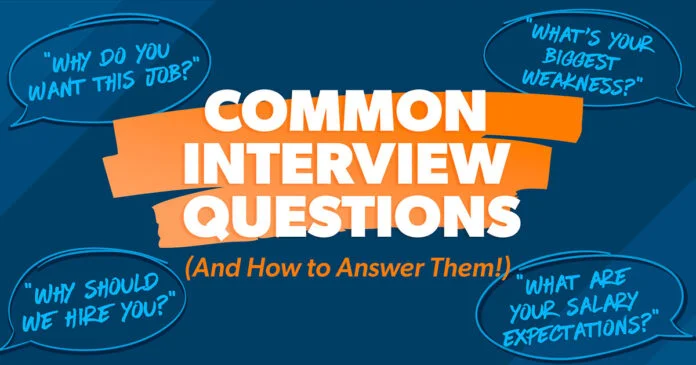In today’s job market, job interviews have evolved in several ways. Here’s what you can generally expect:
Interviews can be high stress, anxiety-driving situations, especially if it’s your first appointment. A little practice and preparation always pays off. While we can’t know exactly what an employer will ask, here are 10 common questions along with advice on how to answer them.
Virtual Interviews: Due to the prevalence of remote work and the ongoing impact of the COVID-19 pandemic, many sessi are conducted virtually using video conferencing tools like Zoom, Skype, or Microsoft Teams. Make sure you’re comfortable with the technology and have a professional-looking background.
Behavioral Interviews: Hiring managers often use behavioral interview questions to assess your past experiences and how they relate to the job you’re applying for. Be prepared to provide specific examples of how you’ve demonstrated relevant skills and qualities in your previous roles.

Technical Assessments: For technical positions, you may be asked to complete coding tests, case studies, or technical exercises to demonstrate your skills and problem-solving abilities.
Panel Interviews: It’s becoming more common to face panel interviews, where you’ll be faced by multiple people simultaneously. Each panel member may have a different focus or role within the organization.
Competency-Based Interviews: Employers may assess your competencies in various areas, such as leadership, teamwork, communication, and problem-solving. Be ready to provide examples of situations where you’ve demonstrated these competencies.
Cultural Fit Assessments: Companies are increasingly looking for candidates who align with their organizational culture. Expect questions about your values, work style, and how you’d fit into the company’s culture.
Soft Skills Assessment: In addition to technical skills, employers place a high value on soft skills like adaptability, resilience, and emotional intelligence. Prepare to discuss how you’ve used these skills in your previous roles.
Remote Work Questions: If the job involves remote work, you may be asked about your experience with remote collaboration, time management, and self-motivation.
Questions About Remote Work Tools: Familiarize yourself with common remote work tools like project management software, communication tools, and video conferencing platforms, as you may be asked about your proficiency with them.
Salary and Benefits Discussion: Expect discussions about salary expectations, benefits, and other compensation-related topics. It’s important to do your research and have a clear understanding of your worth in the job market.
Questions About Your Career Goals: Be prepared to discuss your long-term career goals and how the position you’re interviewing for fits into your career trajectory.

Questions About Recent Achievements: Officers may ask about your recent achievements or projects to assess your current skills and contributions.
Questions About Handling Challenges: You may be asked how you’ve handled difficult situations or conflicts in the workplace. Prepare examples that showcase your problem-solving abilities.
Follow-Up Questions: Expect questions that dive deeper into your resume and experiences. Be ready to elaborate on your accomplishments and responsibilities in previous roles.
Questions for the Interviewer: At the end of the interview, you’ll likely have the opportunity to ask questions. Prepare thoughtful questions about the company, team, and role to show your interest and engagement.
Assessment Center Activities: For some roles, you may be invited to participate in assessment center activities, which can include group exercises, presentations, or simulations to evaluate your skills and teamwork abilities.
Video Recordings: Some companies may ask candidates to record video responses to interview questions before an in-person or live virtual interview.



